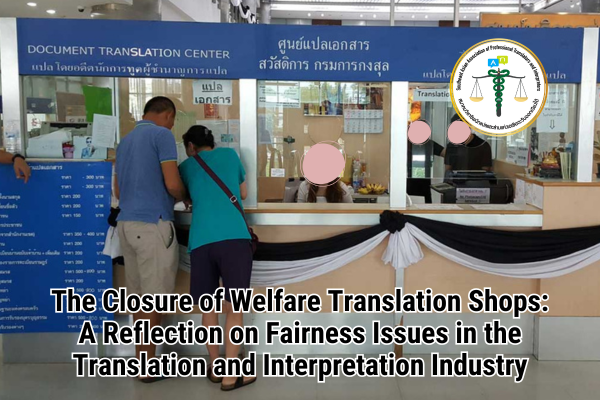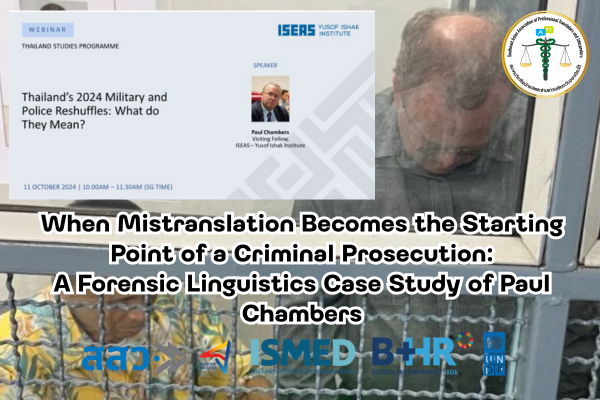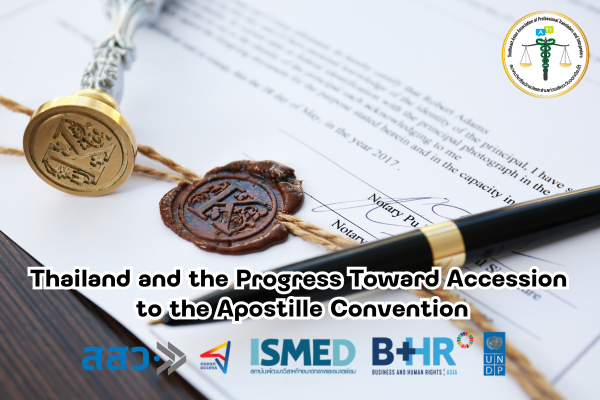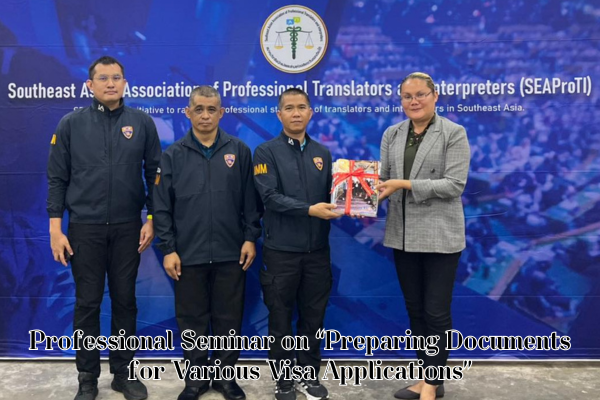The Closure of Welfare Translation Shops:
A Reflection on Fairness Issues in the Translation and Interpretation Industry
In the past, welfare translation shops were a familiar name among those who needed certified translated documents at the Department of Consular Affairs, particularly at its main office in Chaeng Watthana. These shops, located near government offices, were often recommended by officials as the go-to option for translating documents such as educational certificates or paperwork for studying abroad. However, today, these welfare translation shops no longer exist, leaving behind questions about fairness in competition and lessons for the translation and interpretation industry.
A Real-Life Experience with Welfare Translation Shops
One user’s story vividly illustrates this system. When they hired a translation shop near Ploenchit to translate documents for studying abroad, the work seemed complete. Yet, upon submitting it for certification at the Department of Consular Affairs, an elderly legal officer remarked that translations from external shops often required significant revisions. The officer suggested using one of the three welfare translation shops located nearby instead, assuring that their work would be stamped and certified immediately. This situation not only caused inconvenience to the user, who incurred additional costs and time, but also highlighted the advantage welfare shops held over regular translation providers.
An Unequal Advantage
Why did welfare translation shops earn more trust from officials than others? The answer might lie in a special relationship between these shops and government agencies or their deep understanding of the translation standards accepted by the Department of Consular Affairs. Additionally, their proximity to the office and the ability to provide immediate certification may have been part of a system designed to streamline processes for applicants. However, this inadvertently gave welfare shops a competitive edge.
Meanwhile, regular translation shops and freelance translators faced greater challenges. Even if their work was of high quality, without certification or a connection to the agency, it was more likely to be questioned or rejected. If welfare shops also offered services at below-market rates due to subsidies from the government or certain organizations, this further fueled accusations of unfair competition.
The Closure: A Sign of Change
Ultimately, pressure from the public and freelance translators—who viewed welfare translation shops as monopolizing income and seizing opportunities from other providers—may have contributed to their closure. The perception that these shops undermined the earnings of professional translators, who bore the full cost of running their businesses, reflected a market imbalance that could not persist in the long term. Welfare translation shops are no longer in existence today, yet their impact continues to serve as a valuable lesson.
Lessons for the Future
The closure of welfare translation shops underscores the need to foster a business environment in the translation and interpretation industry that promotes fair competition. Establishing clear professional standards—such as translator qualifications, pricing guidelines, or quality certification—could ensure that all parties compete based on true merit rather than external support or special relationships. The fact that welfare shops once held an advantage but eventually shut down serves as a reminder that a system lacking transparency and equality will inevitably face resistance from both users and providers.
The translation and interpretation industry today should seize this opportunity to improve, fostering competition that prioritizes quality and professionalism without the shadow of monopolies or market-distorting interventions. With welfare translation shops now gone, what remains is a chance to build a system where everyone can participate on equal footing.
SEAProTI’s certified translators, translation certification providers, and certified interpreters:
The Southeast Asian Association of Professional Translators and Interpreters (SEAProTI) has officially announced the criteria and qualifications for individuals to register as “Certified Translators,” “Translation Certification Providers,” and “Certified Interpreters” under the association’s regulations. These guidelines are detailed in Sections 9 and 10 of the Royal Thai Government Gazette, issued by the Secretariat of the Cabinet under the Office of the Prime Minister of the Kingdom of Thailand, dated July 25, 2024, Volume 141, Part 66 Ng, Page 100.
To read the full publication, visit: the Royal Thai Government Gazette
การปิดตัวของร้านแปลสวัสดิการ: บทสะท้อนปัญหาความเป็นธรรมในอุตสาหกรรมการแปลและล่าม
28 กุมภาพันธ์ 2568, กรุงเทพมหานคร – ในอดีต ร้านแปลสวัสดิการเคยเป็นชื่อที่คุ้นหูในหมู่ผู้ที่ต้องยื่นเอกสารแปลเพื่อรับรองที่กรมการกงสุล โดยเฉพาะที่สำนักงานใหญ่แจ้งวัฒนะ ร้านเหล่านี้ตั้งอยู่ใกล้หน่วยงานราชการ และมักได้รับการแนะนำโดยเจ้าหน้าที่ให้เป็นตัวเลือกหลักสำหรับการแปลเอกสาร เช่น วุฒิการศึกษา หรือเอกสารเพื่อการเรียนต่อต่างประเทศ อย่างไรก็ตาม ปัจจุบัน ร้านแปลสวัสดิการเหล่านี้ได้ปิดตัวลงแล้ว ทิ้งไว้เพียงคำถามเกี่ยวกับความเป็นธรรมในการแข่งขันและบทเรียนสำหรับอุตสาหกรรมการแปลและล่าม
ประสบการณ์จริงกับร้านแปลสวัสดิการ
เรื่องราวจากผู้ใช้บริการรายหนึ่งสะท้อนภาพของระบบนี้ได้อย่างชัดเจน เมื่อครั้งที่เขาเคยจ้างร้านแปลเอกสารแถวเพลินจิตเพื่อแปลเอกสารสำหรับเรียนต่อต่างประเทศ ผลงานที่ได้ดูเหมือนจะสมบูรณ์ แต่เมื่อนำไปยื่นรับรองที่กรมการกงสุล เจ้าหน้าที่นิติกรสูงอายุกลับแจ้งว่างานแปลจากร้านทั่วไปมักต้องถูกแก้ไขเยอะ และแนะนำให้ไปใช้บริการร้านแปลสวัสดิการ 3 ร้านที่ตั้งอยู่ข้างสำนักงานแทน โดยระบุว่างานจากร้านเหล่านี้จะได้รับการประทับตรารับรองทันที สถานการณ์นี้ไม่เพียงสร้างความยุ่งยากให้กับผู้ใช้บริการที่ต้องเสียทั้งเงินและเวลาเพิ่ม แต่ยังชี้ให้เห็นถึงความได้เปรียบที่ร้านสวัสดิการมีเหนือร้านแปลทั่วไป
ความได้เปรียบที่ไม่เท่าเทียม
เหตุใดร้านแปลสวัสดิการถึงได้รับความไว้วางใจจากเจ้าหน้าที่มากกว่าร้านอื่น คำตอบอาจอยู่ที่ความสัมพันธ์พิเศษระหว่างร้านเหล่านี้กับหน่วยงานราชการ หรือการที่ร้านสวัสดิการเข้าใจแนวทางการแปลที่กรมการกงสุลยอมรับเป็นอย่างดี นอกจากนี้ การตั้งอยู่ใกล้สำนักงานและการอำนวยความสะดวกในการประทับตรารับรองทันที อาจเป็นส่วนหนึ่งของระบบที่ออกแบบมาเพื่อลดขั้นตอนให้ผู้ยื่นเอกสาร แต่กลับกลายเป็นการสร้างข้อได้เปรียบให้ร้านสวัสดิการโดยไม่ตั้งใจ
ในขณะเดียวกัน ร้านแปลทั่วไป รวมถึงนักแปลอิสระ ต้องเผชิญกับความท้าทายที่มากกว่า แม้ว่าจะผลิตงานที่มีคุณภาพ แต่หากขาดการรับรองหรือความสัมพันธ์กับหน่วยงาน งานของพวกเขาก็มักถูกตั้งคำถามหรือปฏิเสธได้ง่ายกว่า หากร้านสวัสดิการยังเสนอบริการในราคาที่ต่ำกว่าตลาดจากการได้รับการอุดหนุนจากรัฐหรือองค์กรบางแห่งด้วยแล้ว ยิ่งทำให้เกิดข้อครหาเรื่องการแข่งขันที่ไม่เป็นธรรม
การปิดตัว: สัญญาณของการเปลี่ยนแปลง
สุดท้าย ความกดดันจากประชาชนและนักแปลอิสระที่มองว่าร้านแปลสวัสดิการเป็นแหล่งผูกขาดรายได้และแย่งโอกาสจากผู้ให้บริการรายอื่น อาจเป็นหนึ่งในสาเหตุที่นำไปสู่การปิดตัวลงของร้านเหล่านี้ การที่ประชาชนมองว่าร้านสวัสดิการบั่นทอนรายได้ของนักแปลมืออาชีพ ซึ่งต้องแบกรับต้นทุนที่แท้จริงของการดำเนินธุรกิจ สะท้อนถึงความไม่สมดุลในตลาดที่ไม่อาจยั่งยืนได้ในระยะยาว ปัจจุบัน ร้านแปลสวัสดิการไม่มีอยู่อีกต่อไป แต่ผลกระทบจากกรณีนี้ยังคงเป็นบทเรียนสำคัญ
บทเรียนสู่อนาคต
การปิดตัวของร้านแปลสวัสดิการชี้ให้เห็นถึงความจำเป็นในการสร้างสภาพแวดล้อมทางธุรกิจที่แข่งขันกันอย่างเป็นธรรมในอุตสาหกรรมการแปลและล่าม การกำหนดมาตรฐานวิชาชีพที่ชัดเจน เช่น คุณสมบัติของนักแปล หลักเกณฑ์ราคา หรือการรับรองคุณภาพงาน อาจช่วยให้ทุกฝ่ายแข่งขันด้วยความสามารถที่แท้จริง แทนที่จะพึ่งพาการสนับสนุนจากภายนอกหรือความสัมพันธ์พิเศษกับหน่วยงาน การที่ร้านสวัสดิการเคยครองความได้เปรียบในอดีต แต่สุดท้ายต้องปิดตัวลง เป็นเครื่องเตือนใจว่าระบบที่ขาดความโปร่งใสและความเท่าเทียม ย่อมเผชิญกับการต่อต้านจากทั้งผู้ใช้บริการและผู้ประกอบการในที่สุด
อุตสาหกรรมการแปลและล่ามในปัจจุบันจึงควรใช้โอกาสนี้ในการปรับปรุง เพื่อให้เกิดการแข่งขันที่เน้นคุณภาพและความเป็นมืออาชีพอย่างแท้จริง โดยปราศจากเงาของการผูกขาดหรือการแทรกแซงที่บิดเบือนตลาด เพราะเมื่อร้านแปลสวัสดิการไม่มีอยู่อีกต่อไป สิ่งที่เหลืออยู่คือโอกาสในการสร้างระบบที่ทุกคนมีส่วนร่วมได้อย่างเท่าเทียม
เกี่ยวกับนักแปลรับรอง ผู้รับรองการแปล และล่ามรับรองของสมาคมวิชาชีพนักแปลและล่ามแห่งเอเชียตะวันออกเฉียงใต้
สมาคมวิชาชีพนักแปลและล่ามแห่งเอเชียตะวันออกเฉียงใต้ (SEAProTI) ได้ประกาศหลักเกณฑ์และคุณสมบัติผู้ที่ขึ้นทะเบียนเป็น “นักแปลรับรอง (Certified Translators) และผู้รับรองการแปล (Translation Certification Providers) และล่ามรับรอง (Certified Interpreters)” ของสมาคม หมวดที่ 9 และหมวดที่ 10 ในราชกิจจานุเบกษา ของสำนักเลขาธิการคณะรัฐมนตรี ในสำนักนายกรัฐมนตรี แห่งราชอาณาจักรไทย ลงวันที่ 25 ก.ค. 2567 เล่มที่ 141 ตอนที่ 66 ง หน้า 100 อ่านฉบับเต็มได้ที่: นักแปลรับรอง ผู้รับรองการแปล และล่ามรับรอง
























